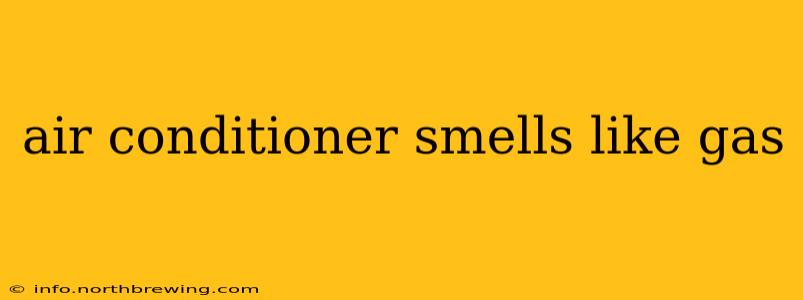The smell of gas emanating from your air conditioner is a serious issue that demands immediate attention. It's crucial to prioritize safety and take swift action to identify and resolve the problem. This smell is never something to ignore, as it could indicate a dangerous gas leak. This guide will walk you through the potential causes, safety precautions, and troubleshooting steps to take when your AC unit emits a gas-like odor.
What Causes an Air Conditioner to Smell Like Gas?
Before panicking, it's important to understand that a gas-like smell doesn't automatically mean a natural gas leak. Several factors could be contributing to this odor. Let's explore the most common culprits:
1. Refrigerant Leak:
This is the most likely cause. Air conditioners use refrigerants, which can have a slightly sweet or chemical smell. A leak, even a small one, can release this odor. Refrigerant leaks are dangerous and require professional attention. Do not attempt to fix this yourself.
2. Burning Electrical Components:
An electrical short circuit or malfunctioning component within the AC unit can cause a burning smell, sometimes mistaken for gas. This is often accompanied by unusual noises, sparking, or even smoke. This is a serious fire hazard and requires immediate professional attention.
3. Natural Gas Leak (Near the Unit):
While less common, a natural gas leak near your air conditioner is a genuine emergency. This could stem from a leak in your gas line, a faulty appliance nearby, or even underground gas pipes. If you suspect a natural gas leak, evacuate the area immediately and call your gas company's emergency number.
4. Exhaust Fumes:
If your AC unit is located near an exhaust vent from another appliance (like a furnace or water heater), exhaust fumes could be drawn into the air conditioner, creating a gas-like smell. Ensure proper ventilation and check for any exhaust issues.
Is it Actually Gas or Something Else?
Distinguishing between a refrigerant leak and a true natural gas leak is crucial. Natural gas is odorless, but a strong-smelling additive (mercaptan) is added to make leaks easily detectable. This additive has a distinct rotten-egg smell. Refrigerant smells vary, but are typically sweet, chemical, or musty.
If the smell is similar to rotten eggs, it's a strong indication of a natural gas leak—call your gas company immediately. If it's more of a chemical or sweet smell, it's more likely a refrigerant leak or other electrical issue within the AC unit.
What to Do if Your Air Conditioner Smells Like Gas
Your immediate actions depend on the suspected source of the smell:
Suspected Refrigerant Leak or Electrical Problem:
- Turn off the air conditioner: Immediately switch off the power to the unit at the breaker box.
- Ventilate the area: Open windows and doors to allow fresh air to circulate.
- Contact a qualified HVAC technician: Schedule an inspection and repair as soon as possible. This is not a DIY job.
Suspected Natural Gas Leak:
- Evacuate the premises immediately: Get everyone out of the house or building.
- Call your gas company's emergency number: Do not attempt to investigate or fix the leak yourself.
- Do not use any electrical appliances or light switches: Sparks could ignite the gas.
How Often Should I Inspect My Air Conditioner?
Regular inspections are key to preventing problems. Ideally, you should have your AC unit professionally inspected and serviced at least once a year, before the peak cooling season. This helps identify potential issues, like refrigerant leaks, before they become major problems.
Can I Repair a Gas Smell in My Air Conditioner Myself?
No. Repairing issues that cause a gas-like smell from your AC unit requires specialized knowledge and tools. Attempting to fix these problems yourself could lead to serious injury, damage, or even death. Always contact a qualified HVAC technician.
By following these steps and recognizing the potential causes, you can address a gas-like smell from your air conditioner safely and effectively. Remember, prioritize safety and call a professional when needed. Don't hesitate – your safety is paramount.
